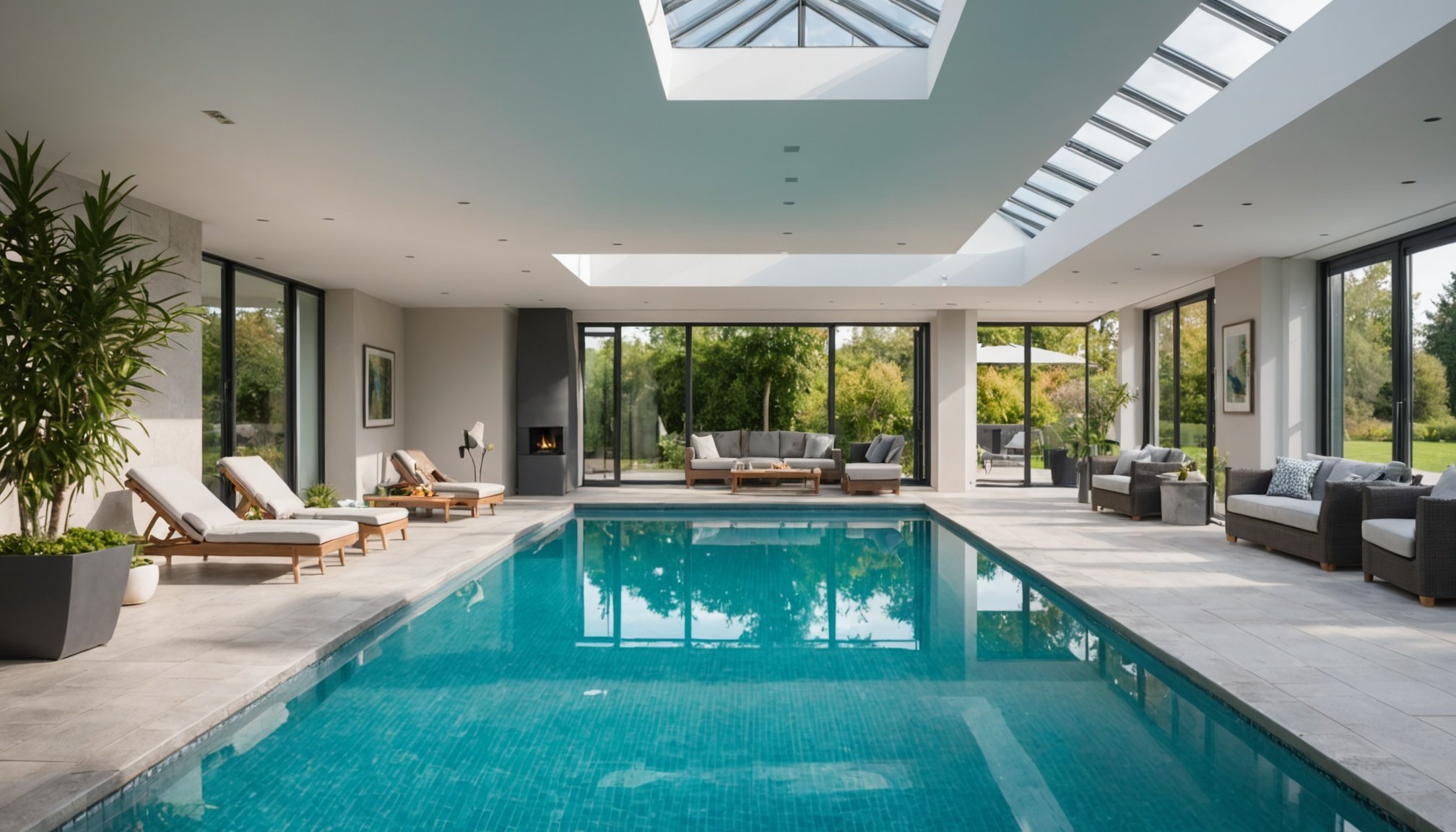Introduction to Energy Efficiency in Swimming Pools
The importance of energy efficiency in swimming pools cannot be overstated, especially for UK homeowners seeking to reduce costs and environmental impact. Enhancing energy efficiency not only leads to significant financial savings but also contributes to a greener planet, reducing the carbon footprint of your swimming pool.
Energy efficiency in swimming pool operations allows homeowners to optimise the use of electricity, heating, and filtration systems. This is pivotal in the UK, where energy costs can be notably high. Homeowners can enjoy a decline in utility bills, transforming their pools from high-maintenance luxuries into more sustainable features of their properties.
A lire en complément : Mastering Mood Lighting: Transform Your UK Swimming Pool with Color LED Lights
Implementing energy-efficient practices provides environmental benefits through lower greenhouse gas emissions. Applying energy efficiency measures across swimming pools serves as a proactive step toward environmental responsibility.
Moreover, UK regulations play a crucial role in driving energy efficiency for swimming pools. These regulations are designed to guide owners toward sustainable practices by encouraging the application of efficient technologies and practices, setting benchmarks for energy consumption. Adherence not only aligns with national goals for sustainability but also ensures long-term savings for homeowners seeking to make informed decisions about their pool operations.
A lire en complément : Eco-Friendly Solutions for Managing Pool Drainage in Your UK Home
Ultimately, focusing on energy efficient improvements creates ideal opportunities for both saving money and supporting global sustainability efforts.
Energy-Efficient Pool Equipment
When it comes to maintaining a cost-effective and sustainable pool environment, incorporating energy-efficient pumps is a wise decision. These pumps operate by using variable speeds, which can significantly reduce energy consumption compared to traditional pumps. Unlike single-speed pumps that run at full capacity all the time, energy-efficient pumps adjust their speed as needed, which can lead to an energy savings of up to 90%.
Modern pool heating systems offer another avenue for reducing energy expenditure. Heat pumps, in particular, transfer heat from the air into the pool water, providing an efficient alternative to traditional gas heaters. While gas heaters can quickly raise water temperature, they consume substantial amounts of fuel. Conversely, heat pumps use electricity more judiciously and can maintain a comfortable pool temperature with lower energy usage.
To ensure these technologies are working at optimal efficiency, regular maintenance is crucial. Simple tasks such as checking filters, inspecting for leaks, and ensuring the equipment is provided with adequate ventilation can sustain the high performance of both energy-efficient pumps and heating systems. A well-maintained system not only extends the equipment’s lifespan but also maximises the energy-saving potential, allowing you to enjoy your pool with peace of mind.
Utilizing Solar Energy
Harnessing solar energy is an excellent way to transition to more sustainable living. One effective application is solar pool heating. This system uses renewable energy to warm pool water, offering eco-friendly comfort.
Benefits and Systems
Solar pool heating systems function by circulating pool water through solar collectors. These collectors absorb sunlight, gradually heating the water. This process not only reduces energy bills but also diminishes carbon footprints, positioning it as a remarkable green energy solution.
Costs and Savings
Initial installation costs can be significant; however, the long-term savings are substantial. Over time, reduced dependence on non-renewable energy sources compensates for the initial expenses. In the UK, homeowners often see a reduction in energy bills robust enough to justify the upfront investment within a few years.
Maximizing Solar Energy in UK Climates
To maximize solar energy use, especially in the UK climate where sunshine can be inconsistent, strategic positioning of solar collectors is crucial. This might involve installing collectors in areas that receive maximum sunlight and periodically cleaning them to enhance efficiency. Supplementary systems, like thermal blankets, can help retain heat, optimising performance even during cloudy days.
The Role of Pool Covers
Pool covers provide numerous benefits, including heat retention and evaporation reduction. These advantages not only enhance your swimming experience but also contribute significantly to energy savings and water conservation.
When it comes to types, there are several pool covers available, each with distinct features. Solar covers, for instance, are designed to maximize heat retention by capturing sunlight, which can increase pool temperature by several degrees. This type is particularly effective in reducing evaporation as the cover acts as a physical barrier against water loss.
Additionally, automatic pool covers provide a practical solution for safety and convenience. With just a push of a button, they secure your pool efficiently while also aiding in energy savings by maintaining water temperature. Safety covers, on the other hand, are robust enough to support weight, making them ideal for households with children or pets.
Selecting the right pool cover involves considering your pool type and specific needs. Evaluate factors such as your local climate, the level of privacy needed, and budget constraints. Opt for a cover that balances functionality with durability to optimize both energy savings and the longevity of your pool.
Efficient Water Circulation Systems
Optimal pool circulation is crucial for ensuring both clean water and energy conservation. Simply put, maintaining efficient water movement can significantly reduce energy consumption while keeping your pool inviting. When water moves properly, it assists in dispersing chemicals, maintaining clear water, and preventing algae buildup. Thus, enhancing efficient filtration and overall water management.
Variable speed pumps play a pivotal role in improving circulation efficiency. These modern pumps adjust to the pool’s necessities, unlike traditional single-speed pumps. They operate at lower speeds during periods of low demand, minimizing energy usage while still processing pool water adequately. So, employing these pumps is a smart move for environmentally conscious pool owners seeking to optimize water management.
Reducing water turnover rates is another effective strategy. Instead of rapidly circulating the entire pool volume multiple times a day, focus on turning it over once thoroughly and gradually. This not only conserves energy but also prevents undue wear on the filtration system without compromising cleanliness.
In summary, prioritizing an efficient circulation system isn’t only about maintaining pristine water—it’s about making wise choices to manage both resources and energy responsibly. Such practices ensure a better pool environment and foster longer-term sustainability.
Smart Technology Integration
As savvy homeowners embrace smart pool technology, they unlock new levels of convenience and efficiency. Smart pool management systems integrate seamlessly with existing pool setups, allowing users to automate various tasks that once required manual input. Picture your pool’s filtration system switching on just when it’s needed, saving both time and precious energy. With automation at the helm, pool maintenance becomes less of a chore and more of a hands-off experience.
Energy management systems are game-changers, especially when coupled with smart technology. These systems optimise energy usage, reducing unnecessary expenditure and promoting sustainability. This is particularly beneficial given the UK’s focus on energy efficiency and environmental consciousness.
In the UK market, a variety of apps and devices are available, each offering unique solutions tailored to specific needs. Some popular options include smartphone applications that remotely control water temperature and lighting or smart pumps that adjust their speed and runtime based on pool conditions.
Incorporating smart pool technology not only enhances comfort but also ensures a greener, more economical pool operation. With these advancements, pool owners can enjoy maximum enjoyment with minimal hassle, highlighting the tangible benefits of embracing automation and smart solutions in modern homes.
Landscaping for Energy Efficiency
When aiming to improve energy efficiency in your pool area, thoughtful pool landscaping can make a significant impact. One effective strategy is implementing shading solutions. Trees, pergolas, or large shrubs strategically placed can buffer the pool area from direct sunlight, naturally lowering the surrounding temperature and thus reducing the need for energy-consuming cooling systems.
Another important aspect is the use of natural cooling through landscaping. Plants absorb heat and release moisture through a process called transpiration, which cools the air around them. By selecting and planting greenery near the pool, you optimize comfort and reduce heat presence without additional energy costs.
Windbreaks can substantially improve energy efficiency by minimizing heat loss. Planting dense shrubs or installing fences can block wind from cooling the pool surface, maintaining warmer water temperatures. This is particularly beneficial in areas prone to brisk winds which can significantly lower pool temperatures overnight.
Consider incorporating native plants, renowned for their low water requirements and adaptability, ensuring they thrive with minimal maintenance while supporting an eco-friendly approach. Such choices not only enhance energy efficiency but also contribute to sustainable landscaping that benefits both the environment and your energy bills.
Routine Maintenance Practices
Keeping your pool in peak condition requires routine attention. Implementing effective pool maintenance tips can significantly enhance the longevity of equipment and support energy conservation.
Consider following a seasonal maintenance checklist. This guide will help optimise your pool’s efficiency throughout the year. Adjusting water levels, skimming debris, checking chlorine and pH levels, and inspecting filters are all essential tasks. Missing these can culminate in unnecessary repairs and, more critically, increased energy use.
Avoiding common maintenance mistakes is crucial to curbing excess energy consumption. Overfilling the pool can strain the pump, while neglected filters force the system to work harder, leading to higher bills. Ignoring minor leaks can escalate into major inefficiencies, wasting water and energy.
Hiring certified professionals for your servicing needs is not just about peace of mind; it’s integral for maintaining energy-efficient operations. Experts possess the right skills to handle complex equipment and ensure each component functions optimally. This not only prolongs the life of the pool’s infrastructure but also benefits your power bills, fostering a more sustainable home environment.
Incorporating these practices will foster a reliable and efficient pool in the long term.
Evaluating Energy Providers and Tariffs
Choosing the right energy tariffs is crucial for swimming pool owners in the UK. With various options available, it’s essential to explore both cost-effective solutions and environmentally friendly choices. Energy tariffs vary significantly, ranging from fixed-rate tariffs, which provide a stable rate over time, to variable-rate tariffs that fluctuate depending on the market. Understanding these differences can help in selecting the best plan.
Green energy providers are becoming increasingly popular as more individuals and businesses aim to reduce their carbon footprint. These providers often offer renewable energy options such as solar or wind power, which can be slightly more expensive than traditional energy sources but provide sustainability benefits. Comparing these options against traditional providers can highlight potential savings and environmental advantages.
When negotiating better rates, it’s wise to analyse your energy usage patterns. Highlighting efficient usage or investing in energy-saving technologies can provide leverage in discussions with energy suppliers. For instance, asking for discounts based on off-peak usage or longer contract commitments can lead to reduced costs. By understanding these factors and employing strategic evaluation and negotiation, swimming pool owners can secure more favourable and sustainable energy tariffs.
Exploring Financial Incentives and Grants
Navigating the world of financial incentives can be a game-changer for those interested in making eco-friendly upgrades to their pools. In the UK, multiple schemes are aimed at reducing the cost of adopting energy-efficient technologies. These schemes often focus on encouraging homeowners to implement changes that improve energy efficiency or introduce renewable energy sources.
One such government grant is designed to help offset costs for solar heating systems, which make pools more sustainable. Another example includes incentives for installing efficient pool pumps, reducing electricity use significantly.
Participating in these programs involves a few straightforward steps. Initially, homeowners need to assess the specific eco-friendly upgrades they plan to implement. Following that, researching available grants is crucial. Applications often require detailed project descriptions and estimated costs.
Once eligibility is confirmed, gather all necessary documentation before applying. Most programs evaluate applications based on environmental impact and energy savings potential.
Understanding available options and taking advantage of these incentives not only helps in reducing the financial burden but also contributes to a more sustainable future. Investing time in learning about these opportunities can lead to substantial savings and a reduced carbon footprint. What’s more, these efforts align with the broader goal of promoting renewable energy across homes in the UK.
I’m sorry, I need additional input in order to proceed. Please provide the relevant Section Outline and any associated Keyword or Question Clusters.











